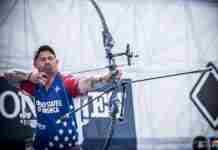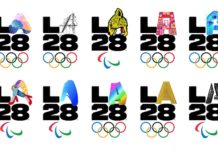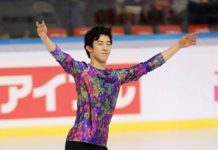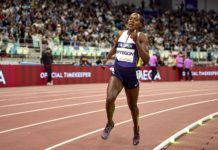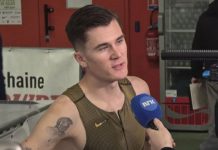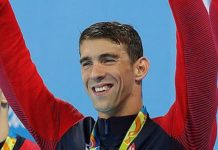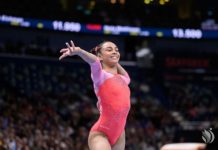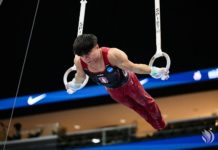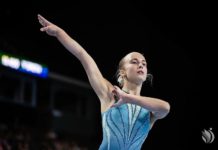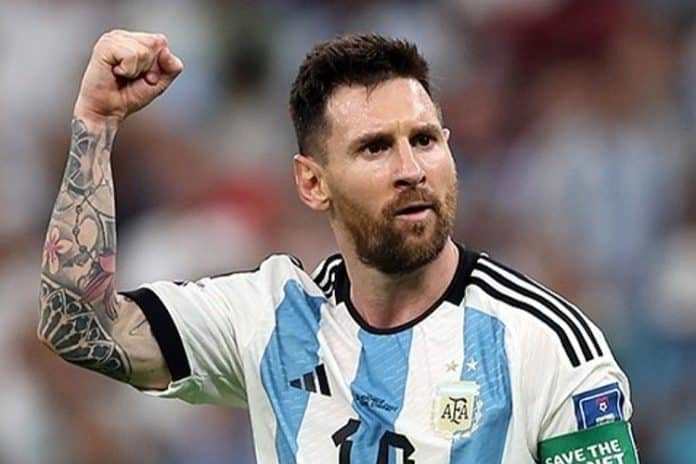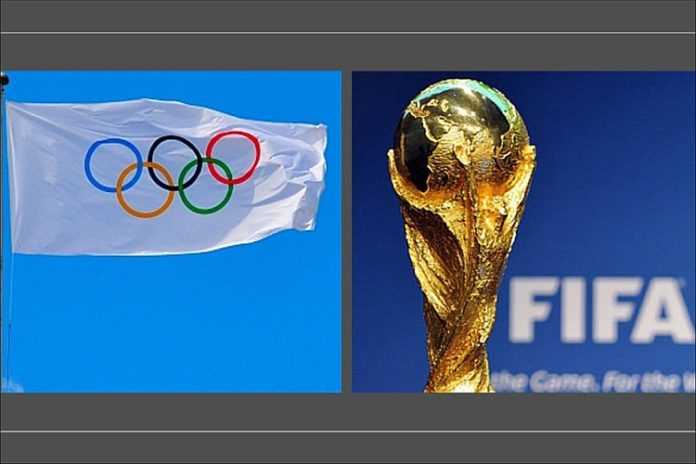★ The Sports Examiner: Chronicling the key competitive, economic and political forces shaping elite sport and the Olympic Movement.★
★ Enjoying our coverage? If so, please consider a donation to help cover technical costs for 2023. Thank you for your support. ★
★ To get The Sports Examiner by e-mail: sign up here! ★
≡ THE 5-RING CIRCUS ≡
1. Argentina wins spectacular World Cup Final on penalties
2. Argentina victorious, but Europe takes 44% of prize money
3. European Super League rebuffed at European Court of Justice
4. World Short-Course Champs finish with 13 world records!
5. World Athletics’ Coe happy about ‘22, planning new 2026 event
The FIFA World Cup came to a spectacular end with a heart-stopping final, as Argentina took a 2-0 lead into the 80th minute and looked like sure winners, only to have France tie it and then both sides got a goal in extra time to end 3-3. Led by superstar striker Lionel Messi, Argentina then won on penalty kicks, 4-2, for its third World Cup title. Although Argentina won the title, Europe won most of the prize money, collecting $192 million out of the $400 million on offer, and only the African, European and South American qualifiers had winning records against other confederations. An important advisory opinion at the European Court of Justice stated that federations like FIFA and UEFA can be both regulators and event operators, allowing them to protect their programs against challenge from the European Super League. The World Short-Course Championships in swimming finished in Australia, with the U.S. topping the medal table amid world (25 m) records in 13 different events! World Athletics President Sebastian Coe said the World Championships in Eugene had a $237 million economic impact, and that a new, worldwide event is being cooked up for 2026, when no Worlds or Olympics is scheduled to take place.
1.
Argentina wins spectacular World Cup Final on penalties
What looked like a rout for 80 minutes turned into a classic as Argentina gave up a 2-0 lead in the final moments of the FIFA World Cup Final in Doha, but finally prevailed on penalties after a 3-3 tie after extra time before 88,966 at the Lusail Iconic Stadium.
Argentina took control right from the start, living in the French zone and putting pressure on French keeper Hugo Lloris. The ball rarely left the French zone, and in the 23rd minute, striker Angel Di Maria dribbled around forward Ousmane Dembele and into the box, but was brought down by Dembele for a clear penalty.
Of course it was superstar Lionel Messi taking his 29th career penalty for Argentina and he stutter-stepped, then sent a clean, left-footed shot into the right of the net with Lloris moving the other way. It was his 24th conversion and his 12th career World Cup goal – tying him with Brazilian icon Pele for fifth-most all-time – and a 1-0 lead.
Then they struck again, with Messi flicking the ball from the midfield down the right side to midfielder Alexis Mac Allister, who was running free toward the box. As the French defense closed in, he sent a perfect cross from right to left and Di Maria finished into the far right side of the net for a 2-0 lead at the 36-minute mark.
At this point, Argentina had 64% of the possession and a 6-0 lead on shots. The half quietly at 2-0, with Argentina controlling the ball 59% of the time and still with a 6-0 shot advantage.
The French needed to get going in the second half, but it was more of the same. The Argentina defense was smothering, and France was not credited with a shot until the 68th minute! Argentina threatened multiple times, including what looked like a Mac Allister breakaway in the 63rd that was shut down by a diving Lloris, who came out to meet the challenge.
But it changed in a second, in the 79th. Substitute French striker Randal Kolo Muani was sprinting towards the Argentina goal along the left side in the 79th, but was dragged down by defender Nicolas Otamendi in the box for an obvious penalty.
And it was Kylian Mbappe, silent all game, who took it and sent a left-footed rocket into the net in the 80th to cut the deficit to 2-1.
Now the French were all on offense. Sub forward Kingsley Coman won the ball from Messi at midfield and sent it to the middle for midfielder Adrien Rabiot who found Mbappe on the left side of the box. Then Mbappe sent a pass into the middle for sub striker Marcus Thuram, who returned it perfectly and Mbappe ripped it into the right side of the net for the – unbelievable – 2-2 tie after 81 minutes. The French scored twice in about 90 seconds, with Mbappe taking the tournament scoring lead with his seventh goal.
The Argentines, just as in the quarterfinal against the Netherlands, gave up a two-goal lead in the final 10 minutes.
Now it was game on again and now it was the French were energized and Argentina trying to hang on. Mbappe just missed connecting with Kolo Muani on a header in the 84th. Four minutes later, Thuram went down in the box, but got a yellow card for diving, instead of a penalty. Rabiot’s shot at 90+4 was saved by the suddenly-under-siege Argentina keeper Emiliano Martinez and covered after bouncing loose in front of goal.
At 90+7, Messi had one more chance and sent a missile from the top of the box – dead center – that was sent over the crossbar by Lloris with his left hand. Extra time.
Both sides were cautious to start, but Argentina got great looks right at the end of the first period, with a Lautaro Martinez shot blocked and then a Gonzalo Montiel shot blocked on the rebound. At the very end of the period, another Martinez shot went just wide to the left.
But Argentina got a breakthrough in the 108th, with a Martinez shot saved by Lloris, but rebounded right to Messi, who netted it for the 3-2 lead, and his seventh goal of the tournament. But France was not done, and in the second extra period, Mbappe sent a hard shot to goal off of a deflection of a corner kick, that was elbowed by Montiel in the box for a penalty, which Mbappe crushed into the left corner for a hat trick and a 3-3 tie in the 117th.
The action got hotter from there. Kolo Muani just missed a header on a feed from Mbappe in the 120th, then Martinez saved a point-black try from Kolo Muani on a kick save in the 123rd and Lautaro Martinez sent a header wide for Argentina in the 124th. But it ended 3-3. Argentina’s possession edge was down to 54-46%, but with a 20-10 edge on shots and 10-5 in shots on goal.
In the shoot-out, Mbappe and Messi made their penalties to start, but then Martinez saved Coman’s try and Aurelian Tchouameni’s shot went wide to the left, while Argentina’s German Pezzella and Leandro Paredes made theirs for a 3-1 lead. Koko Muani made his, but Argentina won it on Montiel’s shot to the left of goal for a 4-2 win and the World Cup title.
¶
It’s Argentina’s third title, adding to their 1978 and 1986 triumphs and the first for Messi in his fifth World Cup. He had been part of Argentina’s loss in the 2014 final in Brazil to Germany, but scored in all five of his World Cup appearances and now has – at age 35 – 13 career World Cup goals in 26 matches, equal-fourth all-time.
France failed in its attempt to win back-to-back World Cups, not done since Brazil in 1958 and 1962. In fact, the French were the first to make to back-to-back finals since Brazil in 1998 and 2002.
Star striker Mbappe became the second player to record a World Cup Final hat trick, previously done only by England’s Geoff Hurst in 1966. Mbappe, only 23, now has matched Brazil’s Pele with 12 career goals in 14 career matches, now equal-sixth all-time.
2.
Argentina victorious, but Europe takes 44% of prize money
The 2022 FIFA World Cup has a prize purse of $440 million, divided by placement, so the payouts included:
● $42 million (1st): Argentina
● $30 million (2nd): France
● $27 million (3rd): Croatia
● $25 million (4th): Morocco
● $17 million (quarters): Brazil, England, Netherlands, Portugal
● $13 million (round of 16): Australia, Japan, Portugal, Senegal, South Korea, Spain, Switzerland, United States
● $9 million (group stage): Belgium, Cameroon, Canada, Costa Rica, Denmark, Ecuador, Germany, Ghana, Iran, Mexico, Qatar, Saudi Arabia, Serbia, Tunisia, Uruguay, Wales
By region, Europe was the big financial winner:
● $192 million: Europe, from 13 qualifiers
● $77 million: South America, from four qualifiers
● $66 million: Asia, from six qualifiers
● $65 million: Africa, from five qualifiers
● $40 million: CONCACAF, from four qualifiers
On the field, African, Europe and South American teams had winning records against other confederations, but Asia and CONCACAF teams didn’t fare as well (records shown as W-L-T):
Africa: 9-8-3 overall
● 7-5-3 in group-stage matches
● 2-3 in playoff matches
Asia: 7-13-1 overall
● 7-10-1 in group-stage matches
● 0-3 in playoff matches
Europe (against non-European opponents): 18-15-7 overall
● 12-10-7 in group-stage matches
● 6-5 in playoff matches
North & Central America and the Caribbean: 3-7-3 overall
● 3-6-3 in group-stage matches
● 0-1 in playoff matches
South America: 11-5-2 overall
● 6-4-2 in group-stage matches
● 5-1 in playoff matches
The tournament awards included:
● Golden Ball for best player: Lionel Messi (ARG)
● Golden Boot for top scorer: Kylian Mbappe (FRA): 8 goals
● Golden Glove for best keeper: Emiliano Martinez (ARG)
● FIFA Young Player Award: Enzo Fernandez (ARG)
● FIFA Fair Play Award: England
Mbappe won the Silver Ball and Luka Modric (CRO) won the Bronze Ball awards and Messi was the Silver Boot winner for his seven goals in the tournament.
3.
European Super League rebuffed at European Court of Justice
The European Football Union (UEFA) and FIFA got a boost from the Court of Justice of the European Union, with the Court Advocate General issuing an opinion on Thursday that rejects the European Super League Company (ESLC) position that these governing bodies cannot be both regulators and competitors in the market:
“[T]he mere fact that a sports federation performs the tasks both of regulator and of organiser of sporting competitions does not entail in itself an infringement of EU competition law. Although a structural separation as advocated by ESLC consisting in entrusting the exercise of the regulatory powers to an independent body with no connection to any undertaking active on the market concerned could eliminate any conflict of interests, it is not the only and necessary solution.”
The opinion emphasized the “European model” of sports in which teams can be promoted and relegated, as opposed to the “American model” of fixed leagues with entry only by the purchase of a franchise. The opinion noted the incompatibility of a mostly fixed-team league with the other competition systems existing in European football now:
“[A] competition with the characteristics of the ESL could have a negative impact on the principle of equal opportunities, which is one component of the fairness of competitions. Thanks to their guaranteed participation in the ESL, certain clubs could book significant additional revenue, whilst continuing at the same time to participate in national competitions in which they would face other clubs which would be unable to generate revenue on a comparable scale, let alone on a permanent and constant basis. The guaranteed revenue from permanent participation at the highest level may be regarded as a significant competitive advantage in financing the acquisition and the remuneration of new players, which is a decisive parameter of competition. The fact that there are currently significant disparities between the clubs taking part in UEFA’s competitions would not be capable of justifying an increase in those disparities.”
The opinion also rejected the ESLC’s position that the position of UEFA (and FIFA) as the governing body makes them a monopoly that cannot be allowed:
“From the perspective of competition law, an undertaking (or an association of undertakings such as UEFA) cannot be criticised for attempting to protect its own economic interests, in particular in relation to such an ‘opportunistic’ project that would risk weakening it significantly. …
“I take the view that the non-recognition by FIFA and UEFA of an essentially closed competition such as the ESL could be regarded as inherent in the pursuit of certain legitimate objectives … in that the purpose of that non-recognition is to maintain the principles of participation based on sporting results, equal opportunities and solidarity upon which the pyramid structure of European football is founded.”
The opinion did outline how a new football league could be established:
“[I]t is clear that [UEFA] approval is not necessary in order for a third party, ESLC for example, to organise a new football competition. As has been stated in point 75 of this Opinion, there is no legal obstacle capable of preventing the clubs participating in the ESLC initiative from setting up and organising freely their own competition, outside the UEFA and FIFA ecosystem. The approval of those federations is thus required only in so far as the clubs participating in the ESL wish to remain affiliated to UEFA and to continue to participate in the football competitions organised by it.”
Such a league which would not have any of the famous franchises on which the European Super League concept is founded negates the entire concept.
The opinion is advisory and a final ruling is expected in early 2023, but observers fully expect the Court Advocate General’s view to be maintained. It may well be the death blow to the European Super League concept being kept alive by just three – Real Madrid, FC Barcelona and Juventus – of its 12 original members.
The Associated Press noted, “The court’s opinion was also a win for governing bodies of Olympic sports whose annual income can be less than the individual salary of many soccer players in Europe and are vulnerable to commercial rivals.”
4.
World Short-Course Champs finish with 13 world records!
The 16th FINA World 25 m Championships concluded in Melbourne with a final, brilliant day of swimming, with world short-course records in three events and the U.S. coming out on top of the medal table.
The American team held a 27-23 edge over Australia going into Sunday’s races, but won nine medals to three for the hosts to finish with a total of 36 (17-13-6) to 26 for Australia (13-8-5). The highlights:
● The U.S. got a 50-100-200 m sweep from Ryan Murphy, who won the 200 m Back in 1:47.41, just ahead of teammate Shaine Casas (1:48.01). It’s the first time one person has swept all three of the men’s Backstroke events at a Short-Course Worlds.
● The U.S. set world records in the men’s and women’s 4×100 m Medleys to finish the meet. The women went first and Lilly King, Katie Douglass, Claire Curzan and Torri Huske finished in 3:44.35, just ahead of Australia (3:44.92) and lowering the 2020 mark set by the U.S. of 3:44.52.
The men got a big lead from Murphy and Nic Fink, but Trenton Julian and Kieran Smith could not match Australian speed and the two teams tied in the men’s final, both breaking the old world mark of 3:19.16 by Russia in 2019, by finishing in 3:18.98.
● Nic Fink won the 50 m Breast in 25.38 – an American Record – to go along with his 100 m Breast title, wins in two relays and two more relay silvers for six total medals!
● Canada’s Maggie MacNeil won her third gold of the meet with a world-record 54.05 in the 100 m Fly, adding to her 50 m Fly gold (tied with Huske) and her 50 m Back win (and world record). Huske was second in 54.75; she finished with seven total medals (4-3-0).
● South Africa’s Chad Le Clos, proving he’s still a terror at age 30, won the men’s 100 m Fly in 48.59 for his second win (also the 200 m Fly). He now owns 20 World Short-Course medals, including 12 golds, from 2010-22.
● Lithuania’s Ruta Meilutyte won the women’s 50 m Breast in 28.50, just off her 28.37 world mark in the semis, with U.S. star King third in 29.11.
● Australia’s lone individual gold on Sunday was a 1:59.26 win for Kaylee McKeown in the 200 m Back; she also won the 100 m Back, just as she did at the Tokyo Olympic Games. The U.S.’s Curzan was second in 2:00.53.
● In the men’s 200 m Free, Korea’s Sun-woo Hwang won in 1:39.72 and Hong Kong’s Siobhan Haughey won the women’s race in 1:51.65.
The championships saw records in 13 events, with two records – and two $25,000 bonuses – for MacNeil in the 50 m Back and 100 m Fly, plus the 50 m Breast (Meilutyte) and 10 relays!
The big medal winners had seven each, led by Douglass (5-2-0), Australia’s Emma McKeon (4-3-0), Huske (4-3-0), Australian sprint star Kyle Chalmers (3-3-1) and Australia’s Mollie O’Callaghan (3-3-1). Murphy also won five golds to tie Douglass, but had six medals (5-1-0) overall.
5.
World Athletics’ Coe happy about ‘22, planning new 2026 event
World Athletics President Sebastian Coe (GBR) told reporters in an end-of-the-year chat that while the economic impact of the federation’s four 2022 championships reached an estimated $316 million – $237 for the Eugene Worlds – that’s just part of the story for a sport which he called one of “only two real global sports. There’s us and football,” noting the then-ongoing FIFA World Cup.
Coe wanted to note the reach of the World Athletics competition programs, which he said included 13,000 athletes from 159 countries that competed in the Diamond League and the 162 Continental Tour meets worldwide. Including the four championship events – indoor and outdoor World Championships, the Team Race Walks and World U-20s – more than a billion people watched track and field on television or by streaming. And the future is bright:
“We’re in good shape. Probably better shape than I thought we’d be in when a few weeks into the role. We went through the hard yards, actually the hard years, where we rewrote, well, we just redesigned the sport.”
Coming up next year is another World Athletics Championships, in a new stadium in Budapest (HUN), a World Cross Country Championships in Australia next February and a new, World Road Racing Championships in Latvia in September.
Coe also has his eye on 2026, a year with no scheduled outdoor Worlds. But that’s an opportunity, as Coe explained:
“I didn’t want the athletes to slide off the radar screen for one year in every four. I wanted them to have the opportunity to really showcase. We’re still working on the format, much to be discussed, much to be agreed upon. But it is, again, indicative of the direction we want to take the sport, which is building profile for the athletes, riding more competition opportunities and unashamedly putting more money in their pockets.
“So there’ll be a focus on the new format, particularly around prize money.”
Coe’s second term will conclude in 2023, but he hinted that he will likely run for another four-year term, saying “I enjoy my job, you know.”
≡ PANORAMA ≡
● Alpine Skiing ● A remarkable scene in St. Moritz (SUI) for the women’s World Cup tour, with Olympic Downhill champ Sofia Goggia of Italy smashing a gate on Friday and finishing second to teammate Elena Curtoni, 1:09.40 to 1:09.69, with Swiss Corinne Suter third (1:10.13) and Americans Breezy Johnson and Mikaela Shiffrin fifth and sixth.
Goggia broke two fingers and went to Milan for surgery and to have her left hand set in a cast, but was back for Saturday’s second Downhill with her poles taped to her glove with yellow duct tape! No problem; she won in 1:28.85, ahead of Ilka Stuhec (SLO: 1:29.28) and Kira Weidle (GER: 129.37). Shiffrin, the seasonal World Cup leader, was fourth in 1:29.46.
Sunday’s Super-G was all Shiffrin, as she won in 1:13.62, beating Curtoni (1:13.74) and France’s Romane Miradoli (1:14.02). For the amazing Shiffrin, still just 27, it was her 77th World Cup win and fifth in a Super-G as she continues to climb the World Cup all-time wins ladder, now five behind fellow American Lindsey Vonn (82).
¶
The men’s tour started in Val Gardena (ITA) with the first win of the season for 2021 World Downhill champ Vincent Kriechmayr (AUT), over reigning World Cup champ Marco Odermatt (SUI), 1:25.44 to 1:25.55. Norway’s Aleksander Aamodt Kilde got his fourth win of the season in Saturday’s Downhill in 2:02.35, over Johan Clary (FRA: 2:02.70). American Travis Ganong tied for seventh and Jared Goldberg was ninth.
The skiing moved to Alta Badia (ITA) on Sunday for Giant Slaloms, with Lucas Braathen (NOR) getting his second win of the season in 2:36.35, ahead of teammate Henrik Kristoffersen (2:36.37) with Odermatt third (2:36.45). There’s another Giant Slalom on Monday.
● Athletics ● Another doping positive, this time for Kenyan-born cross-country star and Steeplechaser Aras Kaya of Turkey, who tested positive for Erythropoietin (“EPO”) in September. This normally carries a four-year suspension, but Aras admitted the violation and accepted a three-year ban as of 22 September 2022.
Kaya, 28, was a 2016 Olympian for Turkey in the Steeplechase and the European silver medalist in that event. He won European cross-country titles in 2016 and 2019 and a silver in 2021.
● Biathlon ● The IBU World Cup circuit was in Annecy (FRA) with a full program, but no change at the top of the men’s podium, as Norwegians won all three races and now seven in a row this season.
Five-time Olympic gold medalist Johannes Thingnes Boe extended his win streak this season to five in the 10 km Sprint, winning in 22:52.2 (0 penalties) over teammate Sturla Holm Laegreid (23:09.8/0) and Benedikt Doll (GER: 23:31.0). But Laegreid took over in the 12.5 km Pursuit (29:44.1/1), with another Norwegian – Vetle Christiansen (30:08.7/2) second and Boe third (30:19.9/2). Sunday’s 15 km Mass Start was a win for Johannes Dale of Norway (35:02.2/2), with Laegreid second (35:02.5/2) and Boe third (35:12.8/3).
The women’s results were more mixed, with Swedes Anne Magnusson and Linn Persson 1-2 in the 7.5 km Sprint (21:04.7/0 to 21:17.5/1). Sweden’s Elvira Oeberg won the 10 km Pursuit (29.42.4/0) over Lisa Vitozzi (ITA: 30:02.8/2) and Austria’s Lisa Theresa Hauser took the 12.5 km Mass Start in 33:54.1/1) for her second win of the season over France’s Julia Simon (34:06.4/2).
● Bobsled & Skeleton ● The U.S. portion of the IBSF World Cup tour concluded with racing in Lake Placid, New York and some surprises.
There was little surprise in seeing two-time Olympic champ Kaillie Humphries team with Jasmine Jones for the U.S.’s first two-women win this season, in 1:54.93, just ahead of German stars Laura Nolte (Beijing Olympic gold, 1:55.05) and Kim Kalicki (2022 European champ, 1:55.52). It was her 29th World Cup win in the two-women sled and she is the only driver to win a medal in all three races so far this season.
Humphries picked up another medal in the women’s monobob, where she is the Olympic champ, but was second to Nolte, 2:01.31 to 2:01.42, with Germany’s Lisa Buckwitz third (2:01.92).
The shocker came in the men’s racing, with double Olympic winner Francesco Friedrich looking unbeatable in the first two races of the season in both two-man and four-man. But he was second in both in Lake Placid, with countryman Johannes Lochner – the Beijing silver medalist – winning the two-man in 1:51.88 to 1:52.20 for Friedrich, with Swiss Michael Vogt third (1:52.26).
In the four, Britain’s Brad Hall scored his first World Cup win in 1:50.36 to 1:50.37 for Friedrich, with Christoph Hafer (GER: 1:50.45) third.
Britain scored another win in the men’s Skeleton with Matt Weston finishing in 1:48.16, ahead of Olympic champ Christopher Grotheer (GER: 1:48.32), while fellow German (and four-time World Champion) Tina Hermann (1:51.06) led a 1-2 with teammate Susanne Kreher (1:51.37). American Kelly Curtis was third in 1:51.39.
● Cross Country Skiing ● American star – and three-time Olympic medalist – Jessie Diggins made more history on Sunday in Davos (SUI) with her 14th career World Cup win, this time in the 20 km Freestyle in 48:32.2. Norway’s Ingvild Oestberg was 5.5 seconds back in second and American Rosie Brennan was third (+11.2) for her seventh career World Cup medal.
The day prior, Diggins finished second in the Freestyle Sprint to Swiss Nadine Faehndrich by just 0.24, 2:36.24 to 2:36.48!
The men’s Sprint was won by Federico Pellegrino (ITA:2:14.21), just ahead of reigning World Cup champ Johannes Hoesflot Klaebo (2:14.46), but Norway won its eighth race in 10 in the men’s World Cup this season in the 20 km Freestyle with Simen Hegstad Krueger leading a sweep in 42:12.3, ahead of Hans Christer Holund (42:34.6) and Sjur Roethe (42:36.8).
● Freestyle Skiing ● The Moguls skiers were at Alpe d’Huez in France, with 2017 World Champion Ikuma Horishima (JPN) getting his first win of the season, over Beijing gold medalist Mikael Kingsbury (CAN), 82.66-80.85. American Cole McDonald was third (75.27).
The Dual Moguls went to Horishima again, over Benjamin Cavet (FRA) in the final. Australia’s Jakara Anthony, the Beijing 2022 gold medalist, won her third straight World Cup competition, again over PyeongChang 2018 winner Perrine Laffont (FRA), 79.70-75.81. Elizabeth Lemley of the U.S. was third for her second medal of the season (75.74).
Japanese teen Anri Kawamura won Saturday’s Dual Moguls over Laffont, with Anthony winning the Small Final for bronze.
¶
At Copper Mountain in Colorado, Halfpipe and Big Air events were on for the Toyota U.S. Grand Prix as well as the FIS World Cup.
The men’s Big Air title went to Norway’s Birk Ruud at 192.00, over Timothe Sivignon of France (184.25), giving Ruud – the Beijing 2022 gold medalist – a sweep of the only two events on the program this season!
Canadian star Megan Oldham won the women’s Big Air, 176.00-172.00 over Swiss Mathilde Gremaud, the Beijing ‘22 Slopestyle winner. The seasonal winner was Tess Ledeux of France, the Beijing ‘22 silver medalist.
The Halfpipe World Cup season opened with a win for American Birk Irving, the 2021 Worlds bronze medalist, 93.75-92.50 over Canadians Brendan MacKay and Noah Bowman (91.00), with two-time Olympic medal winner Alex Ferreira of the U.S. fourth.
Canada scored a 1-2 in the women’s Halfpipe, with Beijing ‘22 bronze medalist Rachael Karker winning (89.50), Amy Fraser second (85.25) and Estonia’s 2019 World Champion Kelly Sildaru third (82.00).
● Ice Hockey ● The 2022-23 Rivalry Series between the U.S. and Canadian women continued this week, in Henderson, Nevada, with Canada winning its first game in four tries, 3-2.
The U.S. had a 1-0 lead on Amanda Kessel’s first period goal, but Canada struck back with two in the second by Jamie Lee Rattray and Blayre Turnbull. The U.S. tied it in the third on a Hilary Knight score, but Sarah Nurse got the winner with 4:56 to play for the 3-2 final.
Game five in the series comes Monday in Los Angeles, the last match for 2022.
● Luge ● The FIL World Cup circuit was in Park City at the Utah Olympic Park, with Italy and Germany dominating the track.
Italian veteran Dominik Fischnaller, the Beijing 2022 bronze medalist, won the men’s Singles in 1:30.068, beating Germany’s 2010-14 Olympic champ, Felix Loch (1:30.253) and 2018 PyrongChang Olympic gold medalist David Gleirscher (AUT: 1:30.272). Fischnaller also took the Sprint title, beating Gleirscher and Loch, 27.552-27.640-27.682.
Germany’s Beijing silver medalists Toni Eggert and Sascha Benecken won the men’s Doubles (1:26.789), with teammates (and three-time Olympic champs) Tobias Wendl and Tobias Arlt third (1:26.867), but Wendl and Arlt came back to take the Sprint with Eggert and Benecken second, 31.862 to 31.872.
Another German sweep in the women’s Singles, with 2018 Olympic silver medalist Dajana Eitberger winning over America’s 2019 Worlds bronze medalist Emily Sweeney – her third silver of the season – by 1:26.471 to 1:26.610, with 2021 World Champion Julia Taubitz third (1:26.619). In the Sprint, Taubitz was the fastest at 31.717 with Eitberger second (31.816) and American Brittney Arndt third (31.902).
The women’s Doubles saw the second straight win for Andrea Votter and Marion Oberhofer (1:28.302), but Austria’s Selina Egle and Lara Kipp get their third win of the season in the Sprint in 32.195, with Votter and Oberhofer close at 32.322.
● Nordic Combined ● The FIS World Cup tour continued in Ramsau (AUT), with the same stars atop the podium once again.
Defending World Cup champ Jarl Magnus Riiber led a Norwegian 1-2 on Friday, in the 97 m jumping and 10 km race, finishing in 24:15.4 to 24:23.3 for Jens Luraas Oftebro, with German Vinzenz Geiger third (24:23.4). But Geiger came back on Saturday to get his 10th career World Cup win, in 25:06.0, ahead of 2021 World Champion Johannes Lamparter (AUT: 25:11.0) and Riiber (25:12.1).
The women was a continuation of the domination of Norway’s Gyda Westvold Hansen, who won both races – 97 m hill and 5 km – in 14:31.0 on Friday and 14:45.7 on Saturday, winning by about a minute each time. She won all four races this season.
● Short Track ● The second weekend of competition at the Halyk Arena in Almaty (KAZ) was another triumph for three-time Olympic gold medalist Suzanne Schulting, who won the first race of the women’s 500 m and the 1,000 m races. She now has six World Cup wins on the season, easily the most. She was joined by countrywoman Yara van Kerkhof, who won her first World Cup title in the second women’s 500 m. Canada’s Worlds silver winner Courtney Sauralt won the women’s 1,500 m for her second win of the season.
American Kristen Santos-Griswold was second to Schulting in the 1,000 m, picking up her fifth medal of the season.
Korea’s Ji-won Park was the big winner on the men’s side, taking the 1,000 m and 1,500 titles for his fourth and fifth wins on the season. Home favorite Denis Nikisha won the second 500 m race – his first World Cup win in six seasons – then proposed to his girlfriend on the ice! (She said yes.) Poland’s Diane Sellier won the first men’s 500 m race, his first World Cup victory.
● Ski Jumping ● Coming into the fourth stop on the FIS World Cup tour, Poland’s Dawid Kubacki and Slovenian Anze Lanisek had won five of the six events this season.
No change in Engelberg (SUI), as Lanisek and Kubacki were 1-2 on Saturday off the 140 m hill – 320.3 to 317.0 – and then Kubacki won on Sunday, with Lanisek third, 300.4 to 293.7, with Austria’s Manuel Feller getting second (297.2).
Kubacki continues as the seasonal leader over Lanisek, 650-576, with a break until the famed Four Hills Tournament begins on the 29th.
● Snowboard ● The Halfpipe and Big Air World Cups were featured at Copper Mountain, Colorado, with three-time World Champion Scotty James (AUS) taking the Halfpipe title over Beijing bronze medalist Jan Scherrer (SUI) in a brilliant competition, 99.00-96.25. The women’s Halfpipe was a win for Spain’s Beijing runner-up, Queralt Castellet, over Canada’s Elizabeth Hosking, 89.75-88.75.
The men’s Big Air winner was Norwegian veteran Marcus Kleveland (184.25), who out-scored American two-time Olympian Chris Corning (172.50). Japan’s Mari Fukada won her first World Cup medal in the women’s Big Air, scoring 155.75 to turn back American Hailey Langland (151.50).
¶
In SnowCross in Cervinia (ITA) earlier in the week, Olympic champ Alessandro Hammerle took the first competition on Friday, ahead of fellow Austrian Jacob Dusek and Germany’s Martin Noerl. France’s Loan Bozzolo won Saturday’s race, with Noerl second; the German is the only one to score a medal in all three races this season.
France’s Beijing silver medalist Chloe Trespauch won the first race for women on Friday, leading a 1-2 with countrywoman Manon Petit-Lenoir, with Britain’s Charlotte Bankes third. But Bankes, the 2021 World Champion, won on Saturday, ahead of Josie Baff (AUS), with Trespeuch getting the bronze.
¶
Parallel Giant Slaloms were held in Carezza and Cortina d’Ampezzo in Italy, with 2021 World silver winner Andreas Promegger (AUT) winning the men’s race in Carezza, ahead of Dario Caviezel (SUI). Michelle Dekker (NED) won the women’s race over Aleksandra Krol (POL).
In Cortina, Roland Fischnaller (ITA), the 2015 World Champion defeated Promegger for the men’s gold, while Slovenia’s Gloria Kotnik, 33, won her first World Cup medal in winning the women’s race, over Germany’s 2018 Olympic bronze medalist Ramona Theresia Hofmeister.
● Speed Skating ● The fourth World Cup of the season was the second in a row held at the Olympic Oval in Calgary (CAN), with another break-out performance for American teen Jordan Stolz.
Still just 18, he won the men’s 1,500 m in the World Cup season opener in Norway in November and added three medals in Calgary, including another win, this time in the 1,000 m in 1:06.72, just 0.30 from the American Record set by two-time Olympic 1,000 m champ Shani Davis back in 2009. He beat Olympic gold medalist Thomas Krol (NED), who finished second in 1:07.16.
Stolz also won a silver in the 500 m, lowering his own American Record from 34.11 to 34.08, behind Korean Jun-ho Kim’s 34.07 winning time. And Stolz collected a silver in the 1,500 m in 1:43.19, behind Olympic champ Kjeld Nuis (NED), who won in 1:42.59.
In the distance races, Olympic bronze winner Davide Ghiotto (ITA) won the 10,000 m in 12:45.10 and Olympic champ Bart Swings (BEL) took the Mass Start in 7:33.20, with American Ethan Cepuran fifth in 7:22.84.
The women’s racing saw three wins for the Dutch, with 2022 triple gold medalist Irene Schouten winning the 5,000 m in 6:48.06 and the Mass Start in 8:08.74. Olympic 1,000 m silver winner Jutta Leerdam won that event, beating gold winner Miho Takagi (JPN), 1:12.53 to 1:13.19. American Kimi Goetz won the bronze in 1:13.58.
Korea’s Min-sun Kim won the 500 m in 36.96, ahead of Takagi (37.26) and Olympic champ Erin Jackson of the U.S. (37.35), with Goetz sixth (37.43). Takagi finally got a win in the women’s 1,500 m in 1:52.08, with U.S. star Brittany Bowe fourth in 1:53.25 and Goetz ninth in 1:54.61.
The World Cup circuit stops for now and will conclude with two more meets in Poland in February.
¶
You can receive our exclusive TSX Report by e-mail by clicking here. You can also refer a friend by clicking here, and can donate here to keep this site going.
For our updated, 951-event International Sports Calendar for 2022-23 and beyond, by date and by sport, click here!







